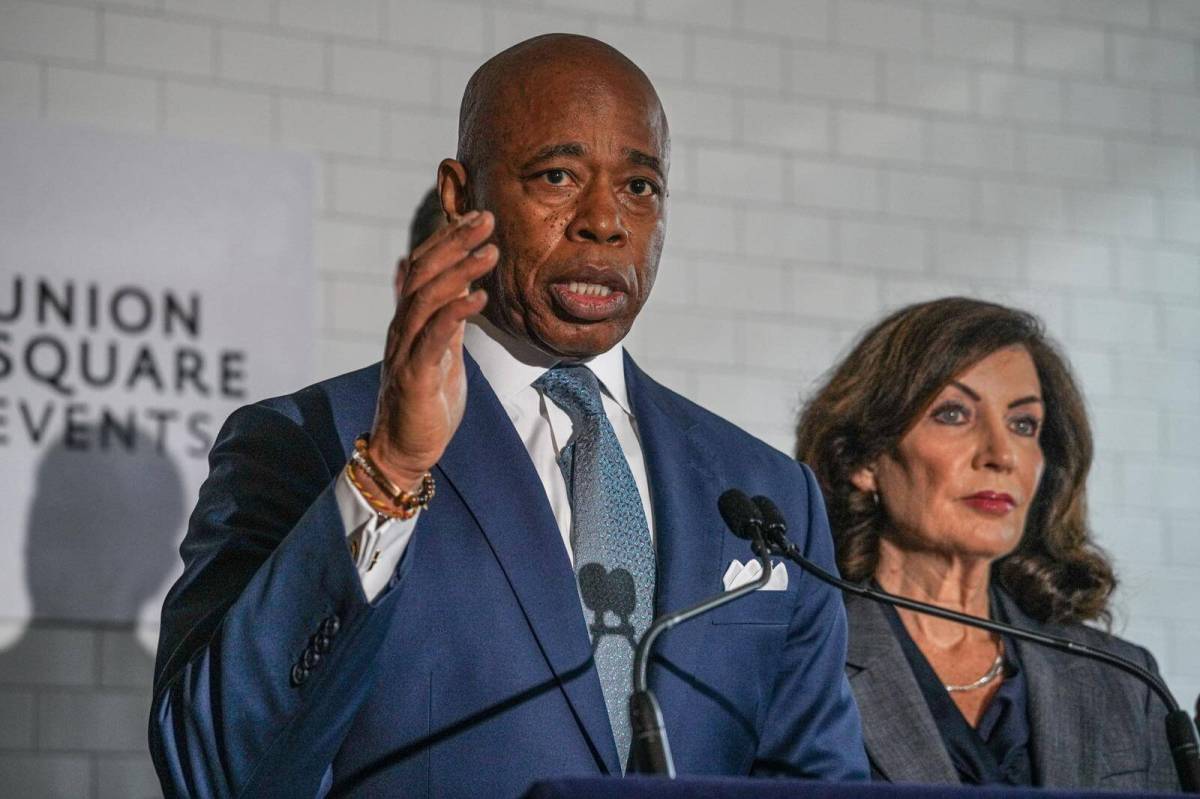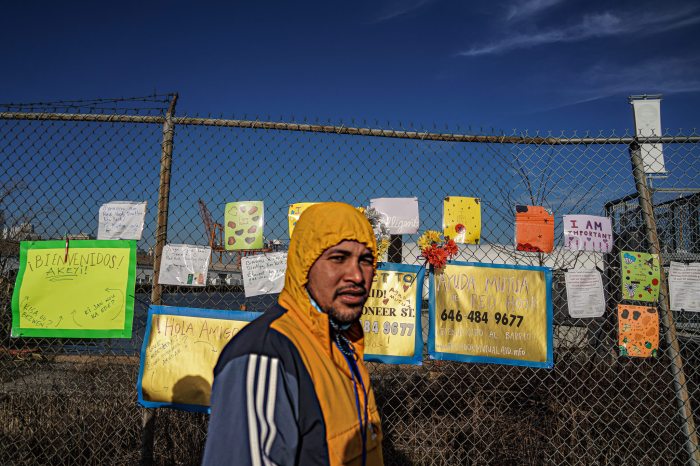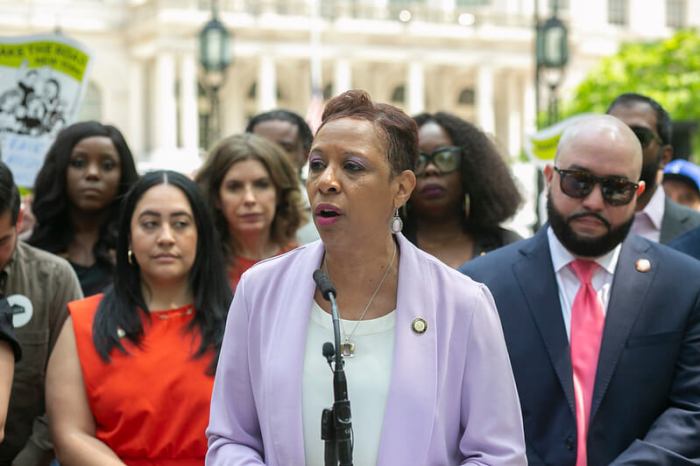After revealing last month that very few of the over 76,000 migrants who’ve come through the Big Apple since last year have actually applied for asylum, Mayor Eric Adams on Tuesday announced he’s opening a center to help newcomers fill out and submit their claims.
The mayor also said his administration is putting $5 million towards funding legal assistance groups that operate clinics and offer workshops on pro se representation — teaching migrants how to represent themselves in court. That amount falls well below the $70 million in legal assistance funding city Comptroller Brad Lander and Council Member Shahana Hanif (D-Brooklyn) called on Adams to include in the Fiscal Year 2024 budget last month.
The “Asylum Application Help Center” will open its doors in the coming weeks with the assistance of legal service provider groups and several top-tier law firms offering free application assistance, according to the mayor’s office. Migrants interested in using the center — which will be located at the American Red Cross Greater New York headquarters in Midtown Manhattan — can schedule one-on-one sessions with “trained application assistants” who will be overseen by immigration attorneys.
Applying for asylum is a critical step toward migrants being able to legally work in the U.S., something the administration says will help more new arrivals move out of city shelters and ease the strain on municipal resources as shelters and emergency facilities have reached their capacity — with over 48,000 migrants staying in both.
“The Asylum Application Help Center will assist the asylum seekers in New York City through the complex federal immigration process, bringing them one step closer to being eligible for work authorization and the ability to support themselves,” Adams said in a statement. “We must act swiftly to ensure the well-being of the thousands of migrants whose deadline to submit an asylum application is fast approaching, and this center will help us do that.”
Recently arrived migrants seeking employment in the U.S. aren’t eligible to work until six months after applying for asylum. Furthermore, they only have one year to submit the application, a date which many asylum seekers who arrived here last spring and summer are reaching. After hitting the one-year mark, they’ll no longer be able to put in for asylum.
The announcement comes after Deputy Mayor for Health and Human Services Anne Williams-Isom, who’s coordinating the administration’s migrant crisis response, last month said only a small number of those who have shown up here since last year have actually filed asylum claims. The low number of applicants, she said at the time, is due to hesitation over a confusing and complex application process that bears serious consequences for doing incorrectly.
The new center will be staffed by application assistants and supervising attorneys — both positions Adams’ office is actively recruiting for.
The assistants will help migrants complete the required paperwork under the supervision of immigration lawyers and with help from on-site translators — due to the fact that many of the asylum seekers are Spanish-speakers. According to a job description posted online by the city, they will “work one-on-one with asylum seekers to assist them in understanding how to complete an asylum application by eliciting important information from them and guiding them through to completion.”
“Each Asylum Application Assistant will be trained on how to assist, handle approximately 2-3 appointments per day and will be supervised and supported by an onsite Supervising Attorney,” the description reads.
The eight-hour-a-day, Monday through Friday gig pays $35 to 58 an hour, according to the job posting. It’ll run from June 26 to Aug. 4 with the opportunity for an extension.
Multiple supervising attorneys will also be on-site to train the assistants and answer any questions about the process, a description of the role says. For that post, the administration is looking for immigration attorneys in good standing with at least two years of experience in the immigration law.
Proficiency in speaking Spanish is “strongly preferred” among applicants for both positions.
The mayor’s office has also enlisted the help of lawyers from legal service providers to serve as supervising attorneys and from elite private firms — including Cleary Gottlieb Steen & Hamilton LLP; Paul, Weiss, Rifkind, Wharton & Garrison LLP; and Simpson Thacher & Bartlett LLP — to fill assistant positions, according to a City Hall spokesperson.
“Simpson Thacher has a long-standing commitment to providing legal services to migrants fleeing dangerous conditions in their home countries,” said Josh Levine, the co-chair of Simpson Thacher & Bartlett LLP’s Pro Bono Committee. “We recognize that the number of immigrant families arriving daily into New York City has reached an unprecedented level and we stand ready to help the city with the services needed to help these children and adults apply for asylum.”
On top of the application help facility, the administration is also funding groups that train asylum seekers on how to represent themselves in court to the tune of $5 million. Those groups include Lutheran Social Services, African Services Committee, Catholic Charities Community Services, and the Pro Se Plus Project.
New York Immigration Coalition Executive Director Murad Awawdeh, in a statement, said that while his group is “pleased” to see the administration putting more resources and funding toward supporting asylum seeker applications, it is “running up against the clock.” Awawdeh also urged Adams to double the dollars going to legal service providers to $10 million — a sum the group pushed for last summer.
“We called for a $10 million investment from the city in emergency legal services last summer, and while we are pleased to see they are starting to support asylum seekers in their application processes, it is running up against the clock for individuals who must satisfy their one year application submission,” Awawdeh said. “Mayor Adams should double this funding to make up for lost time, and to ensure that the long-standing legal service needs of asylum seekers start getting met.”




































